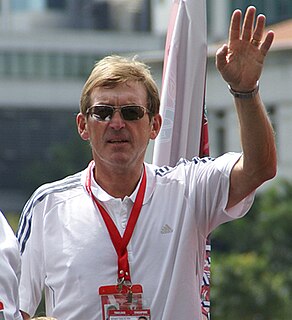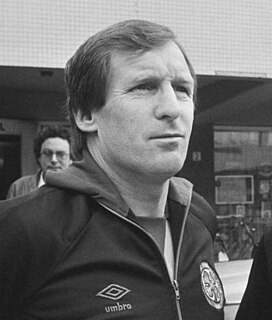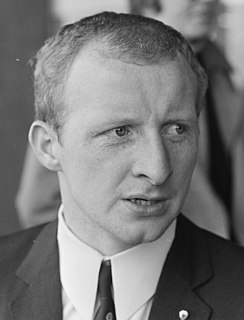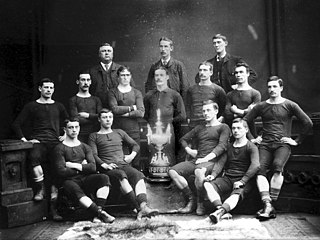Related Research Articles

Sir Kenneth Mathieson Dalglish is a Scottish former football player and manager. During his career, he made 338 appearances for Celtic and 515 for Liverpool, playing as a forward, and earned a record 102 full caps for the Scotland national team, scoring 30 goals, also a joint-record. Dalglish won the Ballon d'Or Silver Award in 1983, the PFA Players' Player of the Year in 1983, and the FWA Footballer of the Year in 1979 and 1983. In 2009, FourFourTwo magazine named Dalglish the greatest striker in post-war British football, and he has been inducted into both the Scottish and English Football Halls of Fame. He is very highly regarded by Liverpool fans, who still affectionately refer to him as King Kenny, and in 2006 voted him top of the fans' poll "100 Players Who Shook the Kop".

The Old Firm is the collective name for the Scottish football clubs Celtic and Rangers, which are both based in Glasgow. The two clubs are by far the most successful and popular in Scotland, and the rivalry between them has become deeply embedded in Scottish culture. It has reflected, and contributed to, political, social, and religious division and sectarianism in Scotland. As a result, the fixture has had an enduring appeal around the world.

William McNeill was a Scottish football player and manager. He had a long association with Celtic, spanning more than sixty years as a player, manager and club ambassador. McNeill captained Celtic's 'Lisbon Lions' to their European Cup victory in 1967 and later spent two spells as the club's manager. As a player and manager, he won 31 major trophies with Celtic.

Celtic Park is the home stadium of Celtic Football Club, in the Parkhead area of Glasgow, Scotland. With a capacity of 60,411, it is the largest football stadium in Scotland, and the eighth-largest stadium in the United Kingdom. It is also known as Parkhead or Paradise.

James Connolly Johnstone was a Scottish footballer who played as an outside right. Known as "Jinky" for his elusive dribbling style, Johnstone played for Celtic for 13 years, and was part of the 'Lisbon Lions', the team who won the 1967 European Cup Final, as well as winning nine consecutive Scottish championships. He scored 129 goals for Celtic in 515 appearances and was voted the club's greatest ever player by fans in 2002.

John "Jock" Stein was a Scottish football player and manager. He was the first manager of a British side to win the European Cup, with Celtic in 1967. Stein also guided Celtic to nine successive Scottish League championships between 1966 and 1974.

Daniel Fergus McGrain is a Scottish former professional footballer, who played for Celtic, Hamilton Academical and the Scotland national team as a right back. McGrain is regarded as one of Scotland's greatest players and throughout the 1970s and 80s as one of the best full backs in world football; sports writer Hugh McIlvanney commented, "Anybody who saw him at his best had the unmistakable impression of watching a great player, probably one who had no superior anywhere in the world."

David Cooper was a Scottish professional football player who played as a winger.
Charles Nicholas is a Scottish former professional footballer. A striker, Nicholas is best known for his spells at Celtic and Arsenal. He won 20 international caps for Scotland, including playing at the 1986 FIFA World Cup.

James Quinn was a Scottish footballer who played for Celtic for 15 years, becoming one of the club's leading goalscorers of all time. He also represented Scotland.
John Kelly "Dixie" Deans is a Scottish retired footballer. He played as a centre forward in the 1960s and 1970s, primarily for Motherwell and Celtic, and was a prolific goal-scorer. Deans played in two international matches for Scotland, both in 1974. He was nicknamed "Dixie" in honour of Everton and England centre-forward Dixie Dean.
Joseph Montgomery Harper is a Scottish former footballer, mainly remembered for his two spells with Aberdeen, during which he won the three main domestic trophies once each and became the club's record goalscorer with 206 goals in major competitions. He also played for Morton and Hibernian in Scotland, and for Huddersfield Town and in England. He finished his career in the Highland League.
The Saint Mungo Cup was a one-off football tournament held in Glasgow, Scotland, to celebrate the 1951 Festival of Britain. The competition was contested by fourteen 'Scottish Division A' clubs together with Clyde and Queens Park from 'Division B'. Celtic defeated Aberdeen 3–2 in the final in front of a crowd of 81,000 at Hampden Park.
The Glasgow Cup is a football tournament open to teams from Glasgow, Scotland. Operated by the Glasgow Football Association, it was competed for annually by senior Glasgow clubs from 1887 until 1989. It is now competed for between the senior teams of Clyde, Partick Thistle and Queen's Park and the youth teams of Celtic and Rangers, and has used both knockout and round robin formats to determine the finalists.
David Alexander Provan is a Scottish former footballer, who played for Kilmarnock, Celtic and Scotland. While playing for Celtic, Provan won four Premier Division medals, two Scottish Cups and one League Cup.
The 1990 Scottish Cup Final was the 105th final of the Scottish Cup, Scottish football's most prestigious knock-out association football competition. The match took place at Hampden Park on 12 May 1990 and was contested by Scottish Premier Division clubs Aberdeen and Celtic. It was Aberdeen's 13th and Celtic's 45th Scottish Cup Final. The clubs had previously met at the same stage of the tournament on five occasions. Celtic were the defending champions of the competition from the previous two seasons having defeated Rangers and Dundee United respectively.
Paul Wilson was a Scottish professional footballer, who played for Celtic, Motherwell and Partick Thistle. His football career peaked in season 1974–75 after being moved to play as a striker when he scored 29 goals for Celtic, including two in that season's Scottish Cup final win. He played for Scotland that season, making him the only non-white player to represent the full Scotland team in the 20th century, and the first footballer with Asian origins to represent any of Scotland, England, Wales and Northern Ireland at senior level.

The Glasgow Merchants' Charity Cup was a knockout football tournament open to teams from in and around Glasgow and later on in the tournament's history, teams from outwith Glasgow. Invitations were made and sent out by the Glasgow Charity Cup Committee (GCCC) at their discretion, but no criteria were ever published.
The 1971 Drybrough Cup was the first staging of Scotland's summer football competition. The competition was won by Aberdeen, who defeated Celtic 2–1 in the final.
References
- ↑ "Drybrough Cup". Scottish Football Historical Archive. Retrieved 14 December 2021.
- 1 2 Eddie Turnbull with Martin Hannan (29 June 2012). Having a Ball. Mainstream Publishing. ISBN 9781780574684.
- ↑ Russell, Grant (1 April 2011). "How the Scottish FA tried to revolutionise the offside law". www.sport.stv.tv. STV. Archived from the original on 13 December 2013. Retrieved 13 December 2013.
- ↑ "NOW YOU KNOW: Super Cooper scored great 'keepy-up' goal". Evening Times. Herald & Times Group. 20 September 2012. Retrieved 13 December 2013.
- ↑ Dandy Dons have struck it rich, Sunday Mail, 8 August 1971, via The Celtic Wiki
- ↑ Summer Cup is worth another run, The Scotsman, 7 August 1972, via The Celtic Wiki
- ↑ Last-gasp Hibs grab the cup, Evening Times, 5 August 1973, via The Celtic Wiki
- ↑ Drybrough tonic from 'Old Firm', Evening Times, 5 August 1974, via The Celtic Wiki
- ↑ Sparkling Jardine, Sunday Mail, 5 August 1979, via The Celtic Wiki
- ↑ Drybrough Cup, StMirren.info
- ↑ Cowan is Dons' new Stevie wonder, The Glasgow Herald, 4 August 1980